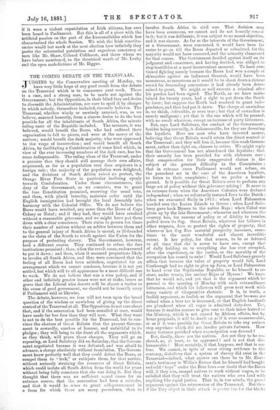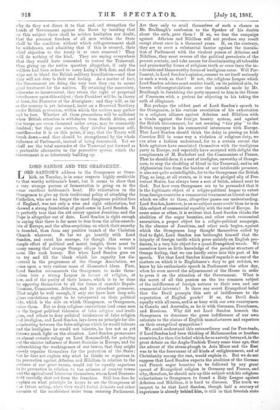THE COMING DEBATE ON THE TRANSVAAL.
JUDGING by the Conservative meeting of Monday, we have very little hope of any good result from the debate on the Transvaal which is to commence next week. There is a case, and a strong case, to be made out against the
Government; but the Opposition, in their blind fury and desire to discredit the Administration, are sure to spoil it by charges in which nobody. themselves included, sincerely believes. The Transvaal, whether wisely or unwisely annexed, was, as we believe, annexed honestly, from a sincere desire to do the best possible for all the inhabitants of South Africa, the minute ruling caste of the Republic included. The measure, it was believed, would benefit the Boers, who had suffered their organisation to fall to pieces, and were at the mercy of the natives; would benefit the dark majority, who were oppressed to the verge of insurrection ; and would benefit all South Africa, by facilitating a Confederation of some kind which, in view of the ever increasing numbers of the dark race, has be- come indispensable. The ruling class of the Transvaal, under a promise that they should still manage their own affairs, acquiesced, as far as a population ever does acquiesce in a
foreign rule ; the majority of the population were delighted, and the divisions of South Africa raised no protest, the Orange River Free State in particular inclining openly towards Confederation. Under those circumstances, the
duty of the Government., as we conceive, was to grant the free Constitution promised, reserving the usual veto, and then, with placid tenacity, maintain order until the English immigration had brought the local Assembly into harmony with the Colonial Office. We do not believe the Boers would have revolted, any more than the Boers of Cape Colony or Natal; and if they had, they would have revolted without a reasonable grievance, and we might have put them down with a clear conscience. Their claim to govern ten times their number of natives without an arbiter between them and to the general injury of South Africa is unreal, as ill-founded as the claim of the South to revolt against the Union for the purpose of protecting slavery. The Government, however, took a different course. They continued to refuse the free institutions promised ; then, when the revolt came, endeavoured to put it down ; and then, when it assumed proportions likely to involve all South Africa, and they were convinced that the feeling of all Boers had been mistaken, negotiated for an arrangement which we cannot condemn, because it is not yet settled, but which will to all appearance be a most difficult one to wok. We do not believe that was a wise policy, and if other and infinitely greater issues were not at stake, issues so
grave that the Liberal who deserts will be almost a traitor to the cause of good government, we should not be heartily sorry if Parliament said so likewise.
The debate, however, we fear will hot turn upon the broad question of the wisdom or unwisdom of giving up the direct control of the Transvaal at all. The Opposition do not care about that, and if the annexation had been annulled at once, would have made far less fuss than they will now. What they want is not to do the best possible for the Transvaal, but to con- vince the electors of Great Britain that the present Govern- ment is cowardly, careless of honour, and unfaithful to its pledges ; they will bring to the front all the arguments which, as they think, will prove those charges. They will go on repeating, as Lord Salisbury did on Saturday, that the Govern- ment negotiated because it was defeated, and was afraid to advance, a charge absolutely without foundation. The Govern- ment knew perfectly well that they could defeat the Boers, or compel them to "trek," or extirpate them, for that matter, without seriously straining the resources of Great Britain, which could isolate all South Africa from the world for years without being fully conscious that she was doing it. But they thought that there was no sufficient moral cause for an extreme course, that the annexation had been a mistake, and that it would be miser to grant self-government in a form for which there are many precedents, than to
involve South Africa in civil war. That decision may have been erroneous, we cannot and do not heartily concur in it; but it was deliberate, it was subject to no moral objection, and it was sincere. As far as the interests of the Government, as a Government, were concerned, it would have been far easier to go on till the Boers departed or submitted, for the majority would not have censured, and the minority clamoured for that course. The Government decided against itself on its judgment and conscience, and having decided, was obliged to stop hostilities at a most inconvenient moment. To have con- tinued fighting merely because the Boers had won a couple of skirmishes against an indiscreet General, would have been monstrous, as monstrous as it would be to shoot down a riotous crowd for demanding concessions it had already been deter- mined to grant. We might as well execute a criminal after his pardon had been signed. The North, as we have main- tained for twenty years, had a right to put down the South by force ; but suppose the North had resolved to grant inde- pendence, and then had put it down. The charge of unwisdom is, we think, defensible, or even true ; but that of cowardice is merely malignant ; yet that is the one which will be pressed, with no result whatever, except an increase of party bitterness.
But, says Lord Salisbury, the conduct of the Government, besides being cowardly, is dishonourable, for they are deserting the loyalists. Here are men who have invested money, believing that Great Britain would retain the direct control of the Transvaal ; and they will lose it, because this weak Govern- ment, rather than fight on, chooses to retire. We might reply that the Government has not abandoned the loyalists ; that their security has been provided for with elaborate care ; that compensation for their exaggerated claims is the subject of the greatest difficulty to the Commission ; that in extreme cases Parliament would not refuse, on the precedent set in the case of the American loyalists, to listen to their complaints ; but we prefer a broader ground. Is it possible for Great Britain ever to perform any large act of policy without this grievance arising ? It arose in an extreme form when the American Colonies were declared independent ; when we voluntarily restored Java to the Dutch: when we evacuated Sicily in 1815; when Lord Palmerston handed over the Ionian Islands to Greece ; when Lord Salis- bury gave back Mysore to the native Baja; when Ca.bul was given up by the late Government ; whenever and wherever the country has, for reasons of policy or of fidelity to treaties, pulled down its flag. Great Britain, whatever her failures in other respects, does so protect the rights of property, that wherever her flag flies material prosperity increases, some- times to the most wonderful and almost incredible extent. Is her policy, for that reason, to be so fettered to all time that she is never to have one, except that of dully holding on to everything she has ever occupied, after the expediency, or the justice, or the morality of the occupation has ceased to exist ? Would Lord Salisbury gravely affirm that because the value of property would fall, Lord Castlereagh had no right to give up Java, or Lord Palmerston to hand over the Septinsular Republic, or he himself to re- store, under treaty, the ancient Rajas of Mysore ? We know that he would not, and yet that is the argument which he pressed at the meeting of Monday with such extraordinary bitterness, and which his followers will press next week with
every variety of vituperative rhetoric. It is, in truth, a foolish argument, as foolish as the argument that brewers are ruined when a beer tax is increased, or that English landlords are plundered when all sugar is admitted duty-free. Yet, because it enables orators to give vent to their inner hatred of the Ministry, which is not caused by African affairs, but by home proposals, it will be dwelt on as if it were unanswerable, or as if it were possible for Great Britain to take any serious step anywhere which did not involve private fortunes. How many fortunes perished when emancipation was decreed ?
But, finally, there are the natives. Are not they to be en- slaved, or, at least, to be oppressed ? and is not that dis- honourable ? Most certainly, if that happens, and that is our fear. We cannot, in spite of some strong evidence to the contrary, disbelieve that a system of slavery did exist in the Transvaal—indeed, what answer can there be to Mr. Ziest- man's testimony in Willis's Rooms that he himself had bought and sold" boys" under the Boer laws —or doubt that the Boers will, if they can, compel natives to work without wages, or be satisfied that they will treat the natives who own land with anything like equal justice. That is, in our minds, the grand argument against the retrocession of the Transvaal. But then if the Tory object in their attack is protecion for the blacks
why. do they not direct it to that end, and strengthen the hands of Government against the Boers by insisting that on this subject there shall be neither hesitation nor doubt, that the personal freedom of all men within the State shall be the condition without which self-government shall be withdrawn, and admitting that if this is secured, their chief objection to the treaty is at once removed ? They will do nothing of the kind. They are saying everywhere that they would have consented to restore the Transvaal, thus giving up the native question altogether, if only the soldiers had been ordered to carry Laing's Nek first, and thus wipe out in blood the British military humiliation—and that they will not deny is their real feeling. As a matter of fact, the Government are doing the very best they can to secure good treatment for the natives. By retaining the suzerainty, otherwise so inconvenient, they retain the right of perpetual interference upon this subject : their President will be, in theory at least, the Protector of the Aborigines ; and they will, so far as the country is yet informed, insist on a Reserved Territory under British protection, within which the natives may gather and be free. Whether all these precautions will be sufficient when British attention is withdraWn from South Africa, and the troops are seven thousand miles away, may be reasonably doubted ; but they are sincere, they involve immense self- sacrifice—for it is on this point, if any, that the Treaty will break down—and they should be strengthened by the whole influence of Parliament, instead of being denounced. Yet we haU see • the total surrender of the Transvaal put forward as a preferable alternative to the protective system which the Government is so laboriously building up.



































 Previous page
Previous page